
2020 Graduates tapped to create their own nostalgia during this pandemic.
Gilbert S.C. Keith-Agaran
In small towns all over our state and hometown USA, high school graduation rites mark an important milestone for students and their families. Maui is no different. Graduation is both an ending and a beginning, capturing warm memories of the past and big dreams for the future. Former Governor Neil Abercrombie often waxed eloquently about the role of shared rituals in our civic life. Public observances complete one part of our lives while thrusting us into the next phase.
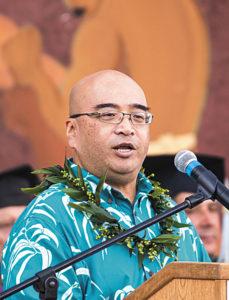
Photo: Leon Matsui
Maui High—the new one in Kahului—is my own alma mater, though I also hold a warm place in my heart for Doris Todd Memorial Christian Day School where I spent my elementary school years.
I can still remember the cadence of the song, sung at football games and assemblies, and finally on graduation night:
We have come, dear Maui High School, In our days of youth, Here to find our joy and pleasure In the search for truth.
Many studies you assign us But we like each one; And in this, our stride for knowledge Leaves no task undone.
Maui High, we all do praise thee For thy wise and kindly rule; ‘Tis with loving hearts we greet thee Our dear island school.
Maui High, we all do praise thee For thy wise and kindly rule; ‘Tis with loving hearts we greet thee Maui High our island school.
I probably did not appreciate until years later that my marching down the War Memorial Stadium stairs to the strains of Pomp and Circumstance meant as much to my family as it did to me. My father, a Sakada, came to Hawai‘i with perhaps a sixth-grade education. My grandfather never mentioned how much schooling he had in the Philippines. They both came from stolid Ilocos Norte farm stock before contracting to work on Hawai‘i’s plantations. My mother finished a teaching training program but when she came to Hawai‘i she settled into a job at the Maui Pine Cannery.
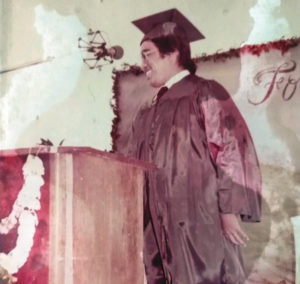
Photo courtesy Gil Keith-Agaran
Together, we graduates—uniform in our Saber blue and white caps and gowns—performed Seawind’s “Follow Your Road” as our class song, accompanied by a combo of musically gifted classmates. Maui Mayor Hannibal Tavares, as he did for several years in a row in the late-1970s, provided the commencement speech. I am sure he provided us three hundred or so Sabers and the hundreds sitting in the stands great advice. I presented the valedictorian address which was probably too long (the advisor did not give me a time limit). Friends and classmates assured me later that it was memorable and appropriate. My grandfather said it was good. My father grunted approval. My mother cried. My sister said it was probably too long.
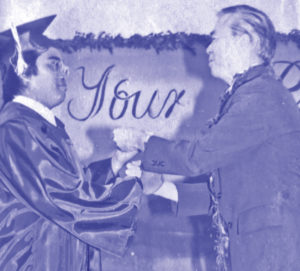
Photo courtesy Gil Keith-Agaran
That was our traditional high school graduation. Looking back, I realize now it was a relatively new thing. As a kid, I attended an older relative’s graduation on the new Maui High School campus rather than the stadium. I remember that it rained.
The class of 1978 held the first commencement service at the War Memorial Stadium. I think it rained.
The class before us—the one with all the smart, good kids like Grant Chun and Michael Murata and Jeffrey Shimbo and Darin Okuyama, and my neighbors Daphne Luna and Renette Carpio—commenced at War Memorial Stadium. It rained that night I seem to recall.
Liquid blessings was part of the Maui High graduation tradition. But if it rained on my graduation night I don’t recall anymore. My memories are of people—classmates, teachers, family and friends.
College commencement was almost a weeklong series of events, full of traditions and services meant to plant nostalgia into our hearts and graft it into our (fundraising) DNA.
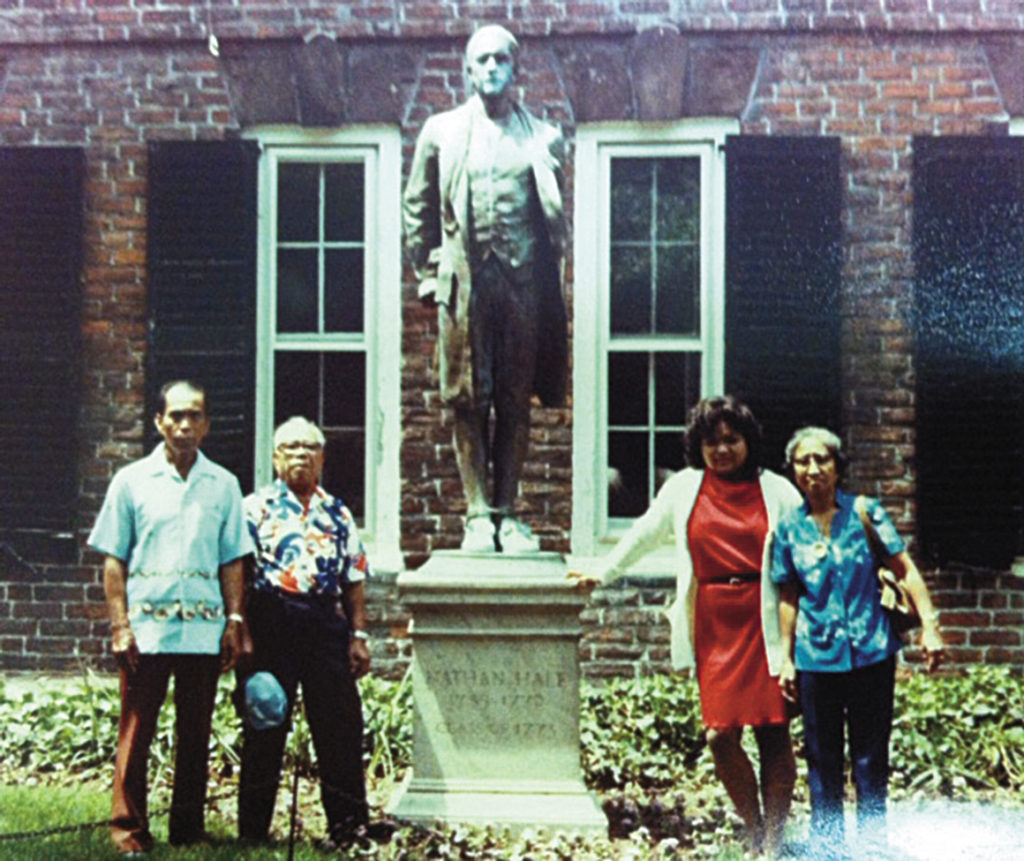
Photo courtesy Gil Keith-Agaran
That May, my family traveled to New Haven, Connecticut and saw for the first time the college and town where I spent their hard-earned share of my tuition. In those days, we had no email or cell phones, let alone smart phones. Term papers were produced on old fashioned typewriters. Later in college, you could input essays on shared computer terminals, sending it to a printer almost a mile away (and you had to make another trip to fetch a corrected document). My mom sent me handwritten letters (sometimes sending me a twenty-dollar bill with her notes). We would speak briefly on the phone every couple of weeks for a few minutes. My sister got a car because they saved money on her tuition.
When I proudly led my family around Old Campus where most freshmen lived, my grandfather grunted and asked why we didn’t just pave it over so there would be more parking for visitors. But with the rest of the family, he posed for a photo with the statue that stood in front of Bingham Hall where I lived my freshman year.
Class Day speaker was TV host Dick Cavett. Some classmates provided an insider baseball history of our class that at the time we couldn’t help but find groan-funny at times. After Class Day, we went back to our different residential colleges for a more intimate ceremony to receive our diplomas and to have a reception with our family and friends.
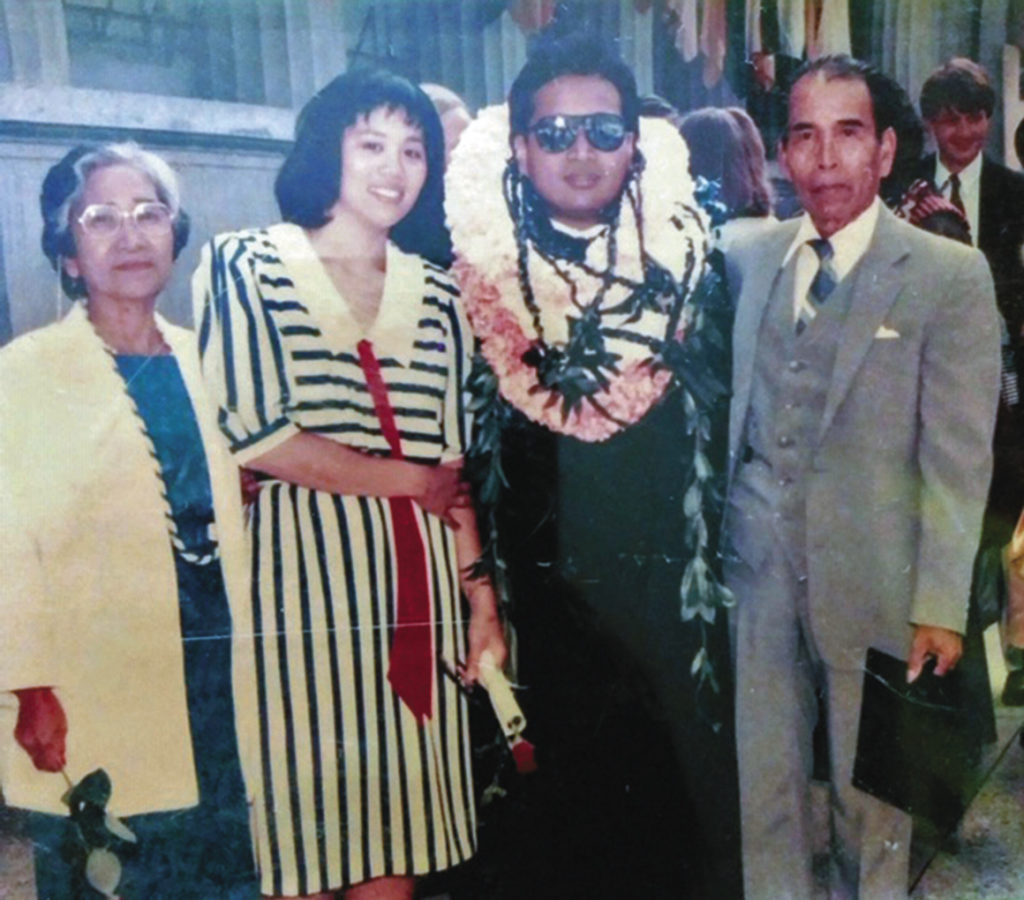
Photo courtesy Gil Keith-Agaran
By the time I finished law school at Boalt Hall, I got the sense my family thought graduations were old hat. As a change of pace, I wore a New York Mets cap with my gown to receive my diploma. I suspected the clan dutifully flew out so they could explore San Francisco and plan a post-ceremony trip to Los Angeles to see other relatives and then a driving trip to Boulder Dam and Begas. They said I would have been welcomed to go along but they advised I needed to stay in the Bay Area to study for the California Bar exam. Both the Giants and the A’s were in pennant races that summer so my law review books spent as much time in the bleachers as the Berkeley law library.
In retrospect, each graduation marked a progression of changes in my life. I hope I learned something about myself during each stop along the way. Now, years later, I value the small good moments more than I did at the time.
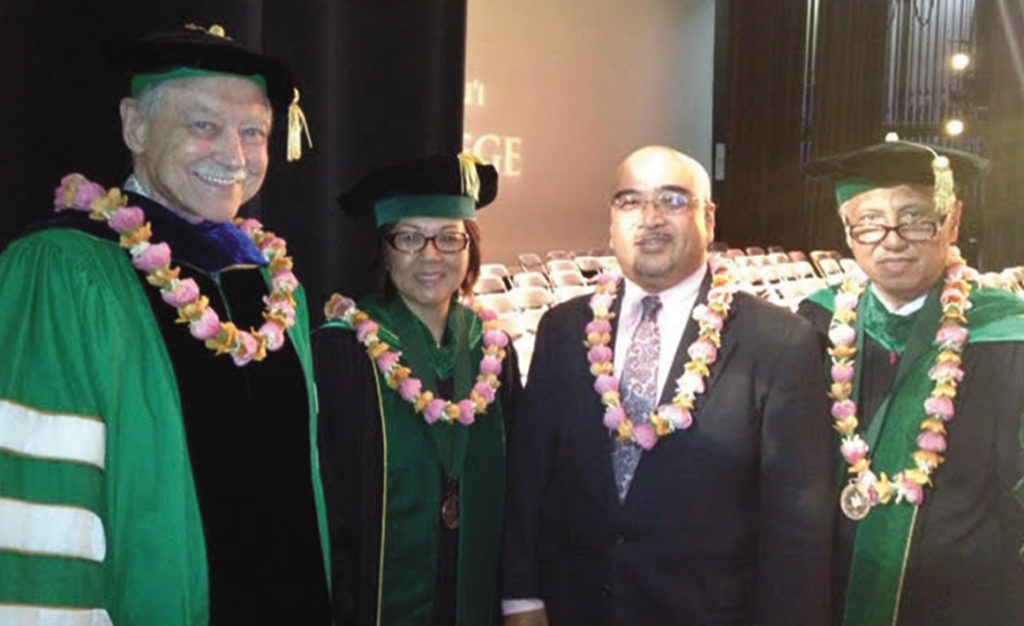
Photo courtesy Gil Keith-Agaran
I’ve had the opportunity to deliver the commencement address twice at the University of Hawai‘i Maui College. In 2013, I told the graduates about the shared experiences of my childhood—guri guri with beans, party telephone lines, camping on undeveloped shorelines in South Maui. I also stole advice from someone else’s speech, urging the graduates to not be afraid to fail spectacularly—because you needed to chance ‘um sometimes. I took my own advice by reciting ‘Ōlelo No‘eau, deathly afraid I would mispronounce some phrase or word. I’m told it was a little long.
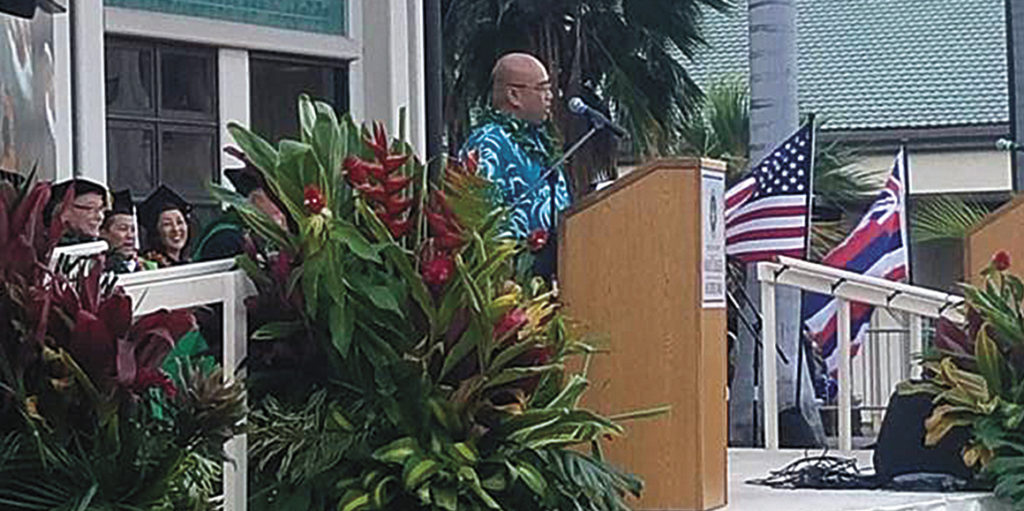
Photo courtesy Gil Keith-Agaran
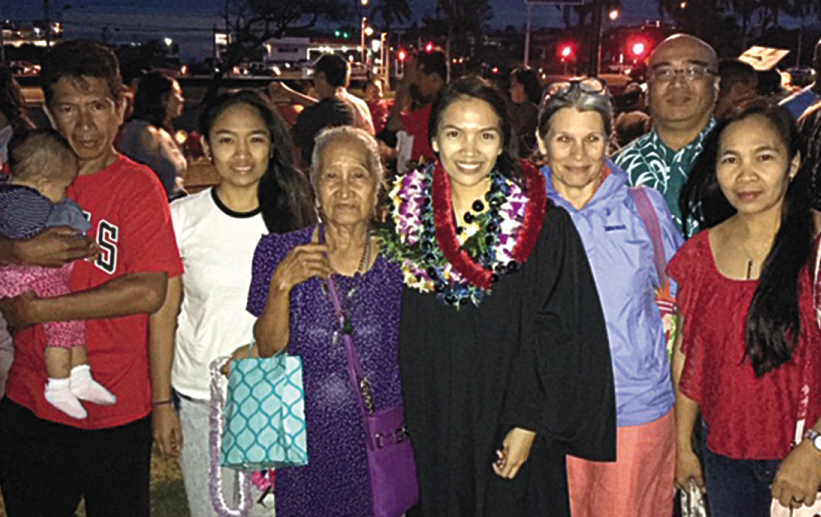
Photo courtesy Gil Keith-Agaran
Despite that, I was asked to give the address in 2017 as well. In that speech, I noted how quickly cultural touchstones had changed in just the four years since my last talk. Then as now, change is simply a given. And the speed of change changes too. I advised them to be pono even if no one else is.
I also suggested that the graduates leave Chancellor Lui Hokoana or President David Lassner a tip as they got their degrees. (“One or two bucks to show your appreciation for a job well done, and at a reasonable price.”) Lui and David must not have gotten much; I haven’t been invited back since.
For this Class of 2020, the end of school must be somewhat melancholy. I can’t help being sad that students will miss the traditional ceremonies. Already, with the County of Maui scheduling repairs to the Wailuku War Memorial Stadium parking lot during the graduation season, this year’s classes were facing a different schedule than past years. For several years, I noted King Kekaulike commencing on Thursday, Baldwin High walking on Friday, Maui High finishing on Saturday and Lahainaluna celebrating on Sunday (I never figured out where Seabury Hall, St. Anthony and Kamehameha fit into the rotation). My first world problem this year was planning where I was gonna park for Baldwin and Maui High’s graduations.
The COVID-19 pandemic, however, will leave Seniors a different experience from earlier Maui graduates. Instead of sharing the event with their classmates, they will have to observe social distancing throughout whatever ceremony is offered. Some will have a parade of cars on campus to receive their diploma sleeves. Others may have online celebrations. Graduation parties will have to wait until more than ten people can gather at a time.
Over the last year, my classmates and I had been talking about our 40th class reunion this June. (We mainly do that on Facebook because we’re old and don’t know Instagram and other social media platforms very well.) It’s tough to even plan the event with so many classmates living off-island, on the mainland, or even abroad, and travel availability literally up in the air. I’m afraid continuing concerns and restrictions over the pandemic may require us to postpone or even cancel our plans. Like the Class of 2020, celebrating our time together at Maui High might have to be done in a different way.
Years from now, I hope their graduation day will not be full of regrets. Instead, I hope they have a measure of pride about living through these strange second semester of their Senior Year. They saw what Maui looks like with less traffic and fewer people on the beaches. They experienced the simple pleasures of spending time with family (with appropriate physical spacing) or not. They learned to love the internet too much. They likely came to appreciate the comforts of gatherings of friends and family and perhaps, as Maui gradually resumes normal, value the way the community cooperated in flattening the proverbial curve.
In a time when sacrifice might be a seldom used notion, the Class of 2020 may have glimpsed a little of what past generations experienced in coming to the islands for the dream of a better life. I would hope, however, that these moments will someday provide the same nostalgia for the moments shared with classmates as my own. More importantly, I trust these young adults can look back and reflect on their parents’ dreams and love for them. Regardless of how the Class of 2020 keeps the commencement rituals, it will become as much their tradition as what my class lived as ours. This brief moment of disappointment should not and will never diminish their accomplishments or their shared memories.
Congratulations to the Class of 2020. Keep moving forward. Dream big dreams.
 Gilbert S.C. Keith-Agaran has walked in three commencement ceremonies—Maui High, Yale College and Boalt Hall School of Law, the University of California at Berkeley. He has represented Central Maui in the State Legislature since 2009.
Gilbert S.C. Keith-Agaran has walked in three commencement ceremonies—Maui High, Yale College and Boalt Hall School of Law, the University of California at Berkeley. He has represented Central Maui in the State Legislature since 2009.
